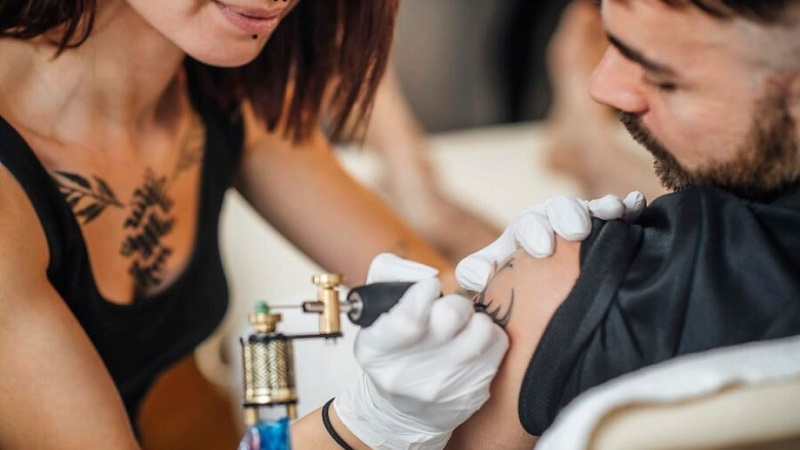Tattoos have become a popular form of self-expression, with many using them to communicate identity, beliefs, and personal experiences. As more people embrace permanent ink, it’s important to consider how tattoos can affect personal relationships. From deepening bonds to creating potential challenges, tattoos play a significant role in how we connect with others.
Tattoos as Personal Identity Markers
Tattoos are not just decorative—they are powerful symbols of personal identity. When entering a relationship, tattoos can offer insight into one’s inner self, providing a unique way to share who we are with a partner. Matching tattoos might represent a shared journey or commitment, while contrasting choices can highlight differences that spark meaningful conversations. However, it’s essential to recognize that tattoos are deeply personal, and the way they impact a relationship can vary. For some, they may strengthen connections, while for others, they might reveal differences that challenge the relationship.
The Psychological Impact of Tattoos on Relationships
Tattoos carry psychological weight, influencing both self-perception and how we engage with others. For many, tattoos enhance self-esteem and body image, leading to a more confident and open connection with their partner. However, the perception of tattoos by a partner can significantly impact the relationship. While some may find tattoos attractive or intriguing, others might feel uncomfortable or disconnected, especially if the tattoos carry symbolic meaning that doesn’t align with their own values.
Studies suggest that tattoos can alter perceptions of attractiveness and social desirability, which may affect relationship dynamics. Tattoos that hold significant meaning, such as memorial tattoos, can deepen emotional connections by revealing vulnerable aspects of one’s life. On the flip side, if a partner feels excluded or uncomfortable with a tattoo’s symbolism, it can create emotional distance.
Tattoos as Symbols of Commitment
In an era where relationships can be fleeting, tattoos have emerged as bold declarations of commitment. Couples often choose matching or complementary tattoos to symbolize their love, creating a permanent reminder of their bond. This act of tattooed commitment carries emotional weight, serving as an unspoken vow between partners.
However, the permanence of tattoos also comes with risks. Relationships evolve, and what feels like an unbreakable connection today might change over time. The decision to get a matching tattoo should not be taken lightly, as it ties the individuals not only to each other but also to a specific moment in time. While the process of choosing a tattoo together can deepen a connection, it also requires careful consideration of the potential consequences if the relationship changes.
Potential Challenges and Misunderstandings
Tattoos can be beautiful expressions of self, but they can also be sources of conflict in relationships. When partners have differing opinions about tattoos, it can lead to tension. Disapproval may stem from cultural beliefs, personal aesthetics, or even jealousy, especially if a tattoo was chosen during a previous relationship.
Misunderstandings can arise when tattoos hold different meanings for each partner. A tattoo that one person sees as simple art might carry significant emotional weight for the other, leading to communication breakdowns. Additionally, as people grow and change, their perceptions of tattoos—and their partner’s tattoos—may also shift, potentially causing disconnection or regret.
In situations where tattoos no longer align with an individual’s current relationship status or personal identity, tattoo removal becomes a viable option. For those facing such challenges, services like Manhattan tattoo removal offer a way to modify or remove tattoos that no longer reflect their present life circumstances. This solution can be especially relevant in navigating relationship changes, providing a fresh start and helping to resolve any lingering discomfort or conflict related to past tattoo choices.
Navigating these challenges requires open communication and mutual respect. Couples who address these issues head-on often find that their relationship becomes stronger as a result, building a deeper understanding of each other’s values and boundaries.
Cultural and Social Influences
Tattoos are shaped by the cultural and social context in which they exist, and these influences can significantly impact relationships. In some cultures, tattoos are deeply rooted in tradition, enhancing connections between partners by aligning with shared values. However, in other cultures, tattoos may be viewed with skepticism or disapproval, leading to social stigma and familial tension.
Social media has also played a role in normalizing and glamorizing tattoos, but this visibility can lead to increased scrutiny. Couples may feel pressured to conform to certain trends or face criticism for their tattoo choices. Despite these challenges, cultural and social influences can provide opportunities for connection, especially for couples from different cultural backgrounds who use tattoos to celebrate their unique heritages.
Conclusion
Tattoos are more than just ink on skin—they are complex forms of self-expression that can deeply impact relationships. From enhancing intimacy to revealing differences, tattoos play a multifaceted role in how we connect with others. The psychological, cultural, and social influences surrounding tattoos add layers of complexity to their impact on relationships.
While tattoos can strengthen bonds by serving as symbols of commitment, they can also pose challenges that require careful navigation. Open communication, mutual respect, and a deep understanding of each other’s perspectives are key to maintaining a healthy relationship when tattoos are involved.
As tattoos become more mainstream, their role in relationships will continue to evolve, offering new opportunities for connection and expression. Whether you’re considering a tattoo with your partner or reflecting on the ones you already have, remember that tattoos are about more than just aesthetics—they’re about meaning, identity, and the stories we choose to share with those we love.
